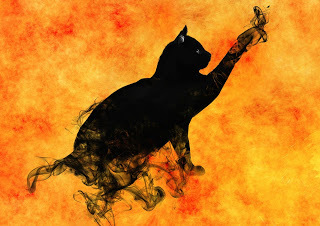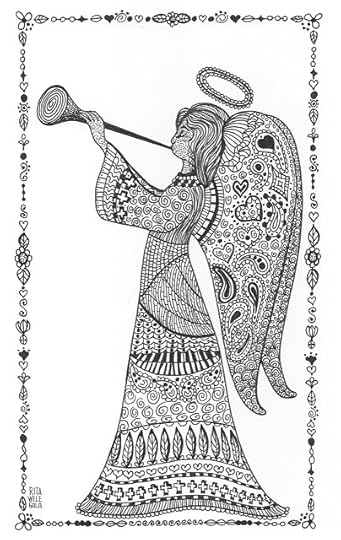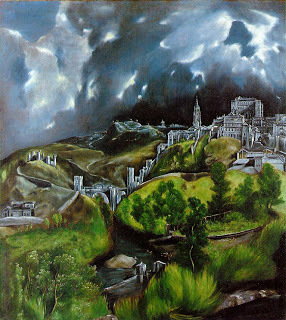Amanda Witt's Blog, page 3
December 27, 2015
AWARDS
Published on December 27, 2015 08:10
December 25, 2015
Merry Christmas!
Published on December 25, 2015 09:20
December 21, 2015
View of Toledo
Published on December 21, 2015 07:11
December 17, 2015
Throwback Thursday: A boy writing ...

From 2006:
Our nine-year-old produced that as his writing assignment today. I think he's showing a definite flair for catchy introductions. Here's another recent offering:
When most people think of sharks, they think of a dorsel fin sticking out of the water chasing down an innocent surfboarder. But not all sharks are like that. The wobbegong shark is like seaweed.
Looking like seaweed would not be useful to us, but it is very useful to a wobbegong shark. They lie very still and pretend to be seaweed. Then, crabs and lobsters come to get a meal among the seaweed. When they get close enough.... GULP! The wobbegong shark gulps them up!
But wobbegong sharks do not eat people, for a variety of reasons. For example, 1. The sharks are usually too small. 2. Humans do not root among the seaweed searching for shrimp and plankton to eat.
So you need not be afraid of wobbegong sharks.
The Punic Wars were NOT puny. In fact they did a greate bit of damage to Rome though it won. For one thing the Punic Wars caused Rome to lose a greate general named Regulas. This story is about him: his life, his death, his reign.And another:
War is not just going out and hacking at each other with swords. Many ancient generals came up with many great strategies.And another:
What if you saw a hamburger lying on the table? You were very hungry and you realy wanted to eat it. You picked it up and you were about to eat it whin it suddenly jumpt up and ate you?! That really happins to some animals!!
Now if I can just persuade him to write about something other than nature red in tooth and claw ...
.........
2015 update: This kid is now a sophomore in college, and an ecology/history major. At the moment, as far as I know, he's somewhere in the Thai jungle ...

Published on December 17, 2015 08:09
Free Ebook--Merry Christmas!

The first book in The Red Series
 can be downloaded for free at Amazon
can be downloaded for free at Amazon for Kindle or at Smashwords for any other ebook format. If you read it and enjoy it, a review at Amazon or Goodreads would be much appreciated. Merry Christmas!
for Kindle or at Smashwords for any other ebook format. If you read it and enjoy it, a review at Amazon or Goodreads would be much appreciated. Merry Christmas!
Published on December 17, 2015 07:20
December 15, 2015
Ink Blots

"A lecturer to a group of businessmen displayed a sheet of white paper on which was one blot. He asked what they saw. All answered, 'A blot.'
The test was unfair: it invited the wrong answer. Nevertheless, there is an ingratitude in human nature by which we notice the black disfigurement and forget the widespread mercy."
--George Butterick

Published on December 15, 2015 09:17
December 9, 2015
Monet and Mueller

Monet Refuses The Operation
Doctor, you say there are no haloes
around the streetlights in Paris
and what I see is an aberration
caused by old age, an affliction.
I tell you it has taken me all my life
to arrive at the vision of gas lamps as angels,
to soften and blur and finally banish
the edges you regret I don't see,
to learn that the line I called the horizon
does not exist and sky and water,
so long apart, are the same state of being.
Fifty-four years before I could see
Rouen cathedral is built
of parallel shafts of sun,
and now you want to restore
my youthful errors: fixed
notions of top and bottom,
the illusion of three-dimensional space,
wisteria separate
from the bridge it covers.
What can I say to convince you
the Houses of Parliament dissolves
night after night to become
the fluid dream of the Thames?
I will not return to a universe
of objects that don't know each other,
as if islands were not the lost children
of one great continent. The world
is flux, and light becomes what it touches,
becomes water, lilies on water,
above and below water,
becomes lilac and mauve and yellow
and white and cerulean lamps,
small fists passing sunlight
so quickly to one another
that it would take long, streaming hair
inside my brush to catch it.
To paint the speed of light!
Our weighted shapes, these verticals,
burn to mix with air
and change our bones, skin, clothes
to gases. Doctor,
if only you could see
how heaven pulls earth into its arms
and how infinitely the heart expands
to claim this world, blue vapor without end.
--Lisel Mueller
Lisel Mueller was born in Germany in 1924. When she was fifteen her family, openly disagreeing with Hitler and under threat from the Nazis, immigrated to the United States. She won the Pulitzer Prize in 1997 for Alive Together.
P.S. The photo is one I took at the Hoh National Rainforest in Washington.

Published on December 09, 2015 09:25
December 3, 2015
Throwback Thursday: Body Parts; or, It versus He
In case you're in the mood for a little reductionism this morning, here's a follow up from the 2007 archive:
Our eleven-year-old must be haunted by the near-loss of his thumb. This morning at breakfast he informed his little brother, "You're a he, but your arm is an it."
His brother nodded, his mouth full of cereal. "Yup." Nothing to argue with there.
"So where's the line between he and it? If you cut off your legs, are you an it?"
His brother considered. "Your legs are its whether they're cut off or not," he said. "But you're always a he, whether you have legs or not."
"Exactly. That's what's so weird. My ear is an it, and my mouth is an it, and my arms are its. So how can I be a he if all my parts are its?"
"Because together they make you, and you're a he."
"But what if they're not together? If you cut off an ear, you're still a he. If you cut off a leg, you're still a he. I'm asking where the line is--at what point have you cut off so much that what's left is just an it, not a he. What if--I'm just speculating here--what if you're all cut in tiny bits?"
His brother grimaced. "If you're all cut in bits, your body would be dead, and it would be an it. You'd still be a he, but you'd be gone."
"My parts are its whether they're alive or dead. All put together they're he, but only if enough of them are put together to make me alive. So you're saying being dead makes the it of my parts take over the he-ishness of me altogether, and then I, or at least my body, is an it?"
His brother stared at him. "I don't know what you just said."
"Plants are alive, and they're always its. They aren't hes when they're alive and its when they're dead."
"All I know is I want to eat my breakfast, and you're a he."
The eleven-year-old pushed away from the table and said, with great urgency, "But what makes me a he?"
Their older sister, wandering in at that moment, looked startled.
"It isn't what it sounds like," I told her.
She studied her brothers. "Does this have something to do with chromosomes?"
"Actually, no," the eleven-year-old said. "You can't cut off a Y and make me an X. But you can cut off my legs."
His sister stared at him blankly. "I think I'll shower before breakfast," she said, and turned and left the room.
He was undeterred. "There's nothing you can cut off that would make me an it," he said. "But all my bits are its. If my hand is doing sign language, it's doing sign language. So why am I not an it? How can my parts be its and I be he?"
His little brother sighed and put down his cereal spoon. "Just listen," he said. "If your hand is doing sign language, it's only doing what you tell it to do. It can't make any decisions on its own, so it's an it. You make the decisions, so you're a he."
At last! I could resist comment no longer. "You're saying that will distinguishes hes and shes from its. That's a good start--though in addition to body parts, you still have to think about people in comas and such."
The eleven-year-old nodded, but his little brother--so recently the fount of wisdom--shook his head and reverted to his natural nine-year-old state. "We aren't talking about shes," he said. "Just hes and its."
Our eleven-year-old must be haunted by the near-loss of his thumb. This morning at breakfast he informed his little brother, "You're a he, but your arm is an it."
His brother nodded, his mouth full of cereal. "Yup." Nothing to argue with there.
"So where's the line between he and it? If you cut off your legs, are you an it?"
His brother considered. "Your legs are its whether they're cut off or not," he said. "But you're always a he, whether you have legs or not."
"Exactly. That's what's so weird. My ear is an it, and my mouth is an it, and my arms are its. So how can I be a he if all my parts are its?"
"Because together they make you, and you're a he."
"But what if they're not together? If you cut off an ear, you're still a he. If you cut off a leg, you're still a he. I'm asking where the line is--at what point have you cut off so much that what's left is just an it, not a he. What if--I'm just speculating here--what if you're all cut in tiny bits?"
His brother grimaced. "If you're all cut in bits, your body would be dead, and it would be an it. You'd still be a he, but you'd be gone."
"My parts are its whether they're alive or dead. All put together they're he, but only if enough of them are put together to make me alive. So you're saying being dead makes the it of my parts take over the he-ishness of me altogether, and then I, or at least my body, is an it?"
His brother stared at him. "I don't know what you just said."
"Plants are alive, and they're always its. They aren't hes when they're alive and its when they're dead."
"All I know is I want to eat my breakfast, and you're a he."
The eleven-year-old pushed away from the table and said, with great urgency, "But what makes me a he?"
Their older sister, wandering in at that moment, looked startled.
"It isn't what it sounds like," I told her.
She studied her brothers. "Does this have something to do with chromosomes?"
"Actually, no," the eleven-year-old said. "You can't cut off a Y and make me an X. But you can cut off my legs."
His sister stared at him blankly. "I think I'll shower before breakfast," she said, and turned and left the room.
He was undeterred. "There's nothing you can cut off that would make me an it," he said. "But all my bits are its. If my hand is doing sign language, it's doing sign language. So why am I not an it? How can my parts be its and I be he?"
His little brother sighed and put down his cereal spoon. "Just listen," he said. "If your hand is doing sign language, it's only doing what you tell it to do. It can't make any decisions on its own, so it's an it. You make the decisions, so you're a he."
At last! I could resist comment no longer. "You're saying that will distinguishes hes and shes from its. That's a good start--though in addition to body parts, you still have to think about people in comas and such."
The eleven-year-old nodded, but his little brother--so recently the fount of wisdom--shook his head and reverted to his natural nine-year-old state. "We aren't talking about shes," he said. "Just hes and its."

Published on December 03, 2015 06:28
December 1, 2015
Pig Poem, for when you're feeling low

I Feel Awful
When life's at its darkest and everything's black
I don't want my friends to come patting my back.
I scorn consolation, can't they let me alone?
I just want to snivel, sob, bellow, and groan.
There's pleasure in weeping, a joy in despair;
There's a great satisfaction in tearing my hair.
Don't tell me I'm handsome: I want to be plain;
I don't want the sunshine; I want it to rain.
Why can't my friends see, when I'm feeling so low,
That the lower I get, then the higher I'll go
Later on. For before you can rise, you must drop;
If you haven't hit bottom, you can't reach the top.
For the way to be helpful to those who are down
Is not to be merry and act like a clown,
But to look on the dark side, and groan, and predict
That ruin impends, and they're finally licked.
So when I feel awful, just point out my flaws,
Don't try to console me and ask me to waltz.
Just tell me I'm stupid, convince me I'm sick,
Assert that my skull is some four inches think.
And then pretty soon when you've got me below
The point where my misery'd normally go,
I'll begin to feel better; I'll shake off my woes,
And I'll haul off and give you a sock on the nose.
By which you will know that your duty is done.
It may have been painful--may not have been fun;
But though flat on your back, with your nose in a sling,
You're satisfied, knowing you've done the right thing.
--Freddy the Pig


Published on December 01, 2015 06:13
November 30, 2015
Well, if you put it that way ...

2006. From my sister:
Yesterday at the doctor's office, [the five year old] was looking through a children's dictionary. She wanted to find the word "cat," so we looked it up. The definition was a little startling. It defined "cat" as a "small, furry, flesh-eating mammal often kept as a pet."

Published on November 30, 2015 08:02









